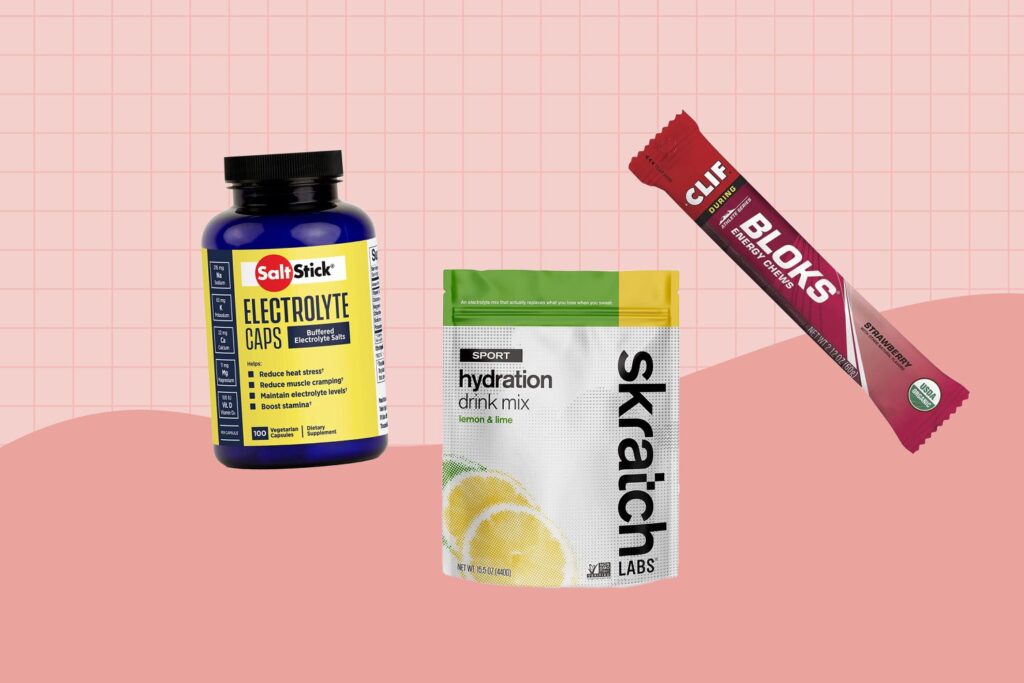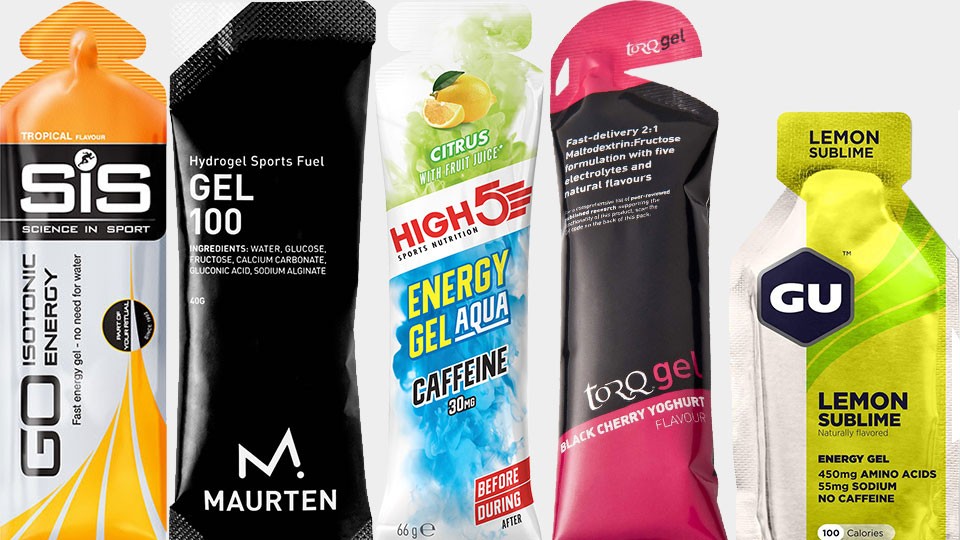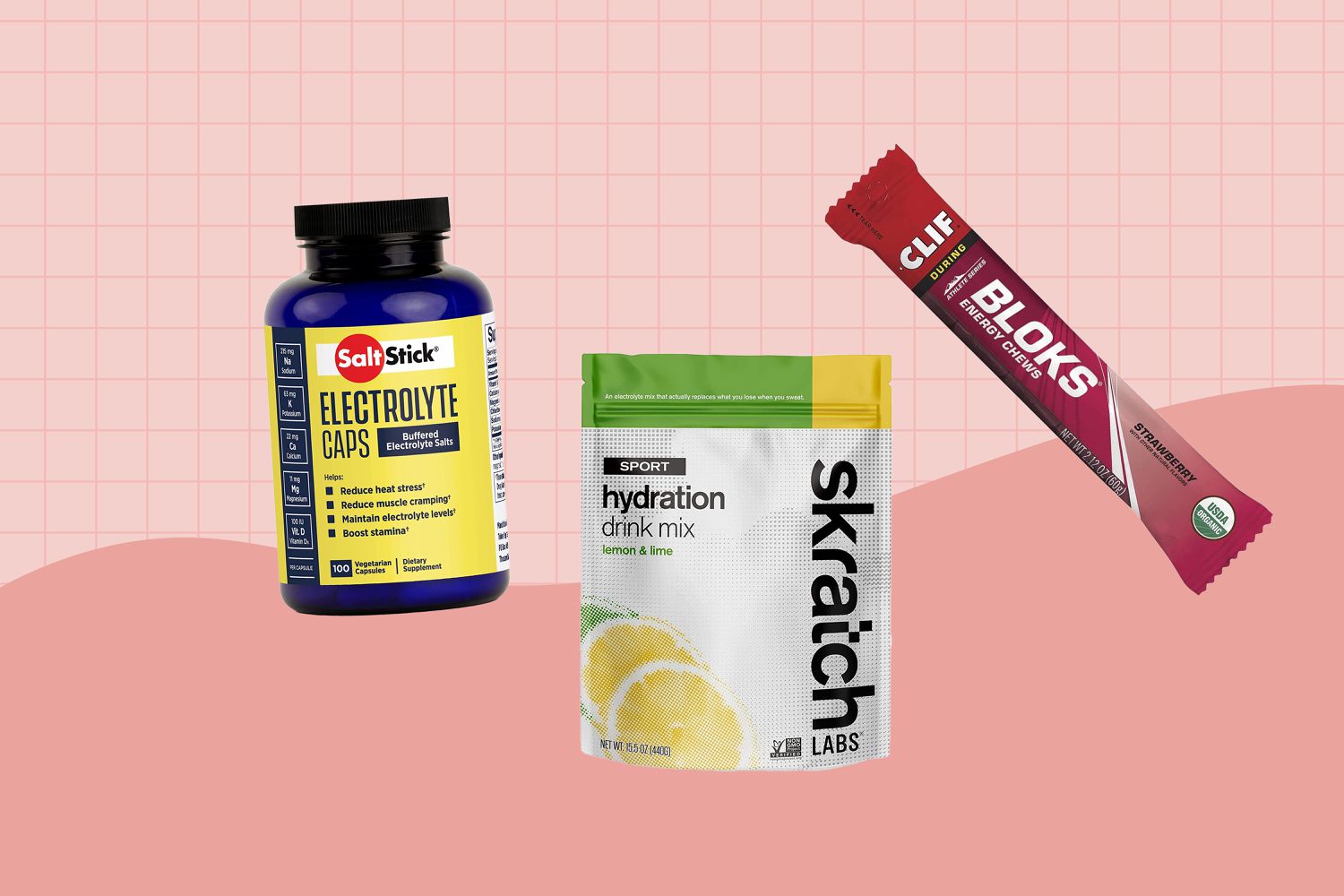
Gels, Blocks, Liquids, and Whole Foods
Endurance runners know the critical role that carbohydrates play in fueling long-distance events and rigorous training sessions (1). Carbs are not just fuel; they’re essential in sustaining energy, improving performance, and aiding recovery. However, with a myriad of carbohydrate supplements available—ranging from gels and blocks to liquids and whole foods—selecting the right type can be overwhelming. This guide aims to break down the pros and cons of each option to help you tailor your nutrition strategy to your endurance activities.
Carbohydrate Supplement Gels: Quick and Convenient Energy

Pros:
- Convenience: Carb gels are highly portable, making them easy to carry and consume during runs or races without breaking your stride.
- Quick Energy: Designed for rapid absorption, gels provide an immediate energy boost, which can be crucial during moments of intense exertion or when hitting the dreaded “wall.”
- Flavor Variety: Available in numerous flavors, carb gels help combat flavor fatigue, a common issue during longer events.
Cons:
- Gastrointestinal Issues: Some athletes may experience stomach discomfort or other digestive issues from the concentrated sugars and additives in gels (2).
- Texture: The sticky, thick texture of gels is a turn-off for some, particularly under strenuous conditions.
- Hydration Requirement: Gels need to be taken with water to enhance digestion and prevent dehydration, requiring good hydration strategies.
Carbohydrate Blocks and Chews Supplements: Enjoyable and Effective
Pros:
- Taste and Texture: Often more palatable than gels, chews offer a chewy texture that can be a pleasant diversion during long-distance efforts.
- Sustained Energy: The slower absorption rate of carb blocks provides a more prolonged energy output, helping to maintain endurance over extensive periods.
- Psychological Satisfaction: Mimicking real food, chews can provide psychological comfort when you crave something solid.
Cons:
- Chewing Challenge: It can be difficult to manage breathing and chewing simultaneously, particularly during high-intensity phases.
- Packaging Size: Blocks and chews generally come in bulkier packaging compared to gels, taking up more space in your running kit.
- Dental Health Risk: The sticky, sugary nature of chews could lead to dental issues if used frequently, especially without proper dental care post-race.
Liquid Carbohydrate Supplements: Hydration Plus Energy
Pros:
- Hydration Combo: Sports drinks kill two birds with one stone by providing both hydration and energy, essential in hot weather or longer races.
- Ease of Consumption: Liquids are easy to consume on the go, allowing for a gradual intake without needing to stop or slow down significantly.
- Electrolyte Boost: Many sports drinks include electrolytes like sodium and potassium, which help prevent cramping and maintain fluid balance.
Cons:
- Caloric Density: To meet high-energy demands, you might need to consume large volumes of sports drinks, which can be impractical.
- Flavor Monotony: The same flavor over a long distance can become less appealing, potentially leading to decreased consumption.
- Bloating: Drinking large amounts can result in bloating and gastrointestinal discomfort, which can hinder performance.
Whole Foods: Natural and Nutritious
Pros:
- Nutritional Content: Whole foods provide not only carbs but also vitamins, minerals, and fibers, offering a more balanced approach to nutrition.
- Cost-Effectiveness: Generally less expensive than specialized sports products, whole foods are an economical choice for long-term training.
- Diverse Options: The variety of whole foods available means you can choose those that best suit your taste and dietary preferences.
Cons:
- Digestion Speed: Whole foods take longer to break down, which might not be ideal during high-intensity or shorter races.
- Convenience Issues: Less portable and messier than other carb forms, whole foods require more preparation and thought on race day.
- Perishability: Unlike packaged supplements, whole foods can spoil, which may limit their practicality in certain scenarios.
How to Choose the Best Carbohydrate Supplement for You
Selecting the right carbohydrate supplement requires consideration of your personal needs, preferences, and digestive comfort. The best approach is to experiment with different types during your training sessions. Note how your body responds, particularly under similar conditions to your target race or activity. Timing is crucial—understand when and how often you need to refuel. Also, always pair your carbohydrate intake with adequate hydration to maximize absorption and performance benefits.
Ultimately, there is no one-size-fits-all solution. Whether you opt for gels for a quick energy burst, enjoy the solid feel of blocks, prefer the dual benefits of liquids, or choose the wholesomeness of natural foods, the right choice is the one that meets your energy needs while keeping you comfortable
Get Your Carbohydrate Supplements Today
How would you like $80 to spend on any nutrition brand or product that you love? That’s right, your newest perk is a $80 annual credit at The Feed.
New to The Feed? The Feed is the largest online store for endurance athletes to get all the nutrition and recovery gear they need to make their next workout even better.
The Feed has every major brand (Skratch, Maurten, SiS, Spring Energy, and over 300 more!). The best part is that you can also buy single servings to mix and match flavors and try new products without buying a whole box of 12. Shipping is free on every order over $75.
It is simple to join Stephanie Small Coaching at The Feed and takes less than 30 seconds.
- Claim your $80 in annual store credit at this link.
- Spend your first drop of $20 right away. Additional $20 Feed credit drops will occur every 90 days.
- Reach out to a sports dietitian to help dial in your fueling plan for free! Contact here!
References
- Burke LM. Nutrition strategies for the marathon : fuel for training and racing. Sports Med. 2007;37(4-5):344-7. doi: 10.2165/00007256-200737040-00018. PMID: 17465604.
- Sareban M, Zügel D, Koehler K, Hartveg P, Zügel M, Schumann U, Steinacker JM, Treff G. Carbohydrate Intake in Form of Gel Is Associated With Increased Gastrointestinal Distress but Not With Performance Differences Compared With Liquid Carbohydrate Ingestion During Simulated Long-Distance Triathlon. Int J Sport Nutr Exerc Metab. 2016 Apr;26(2):114-22. doi: 10.1123/ijsnem.2015-0060. Epub 2015 Aug 31. PMID: 26323018.
